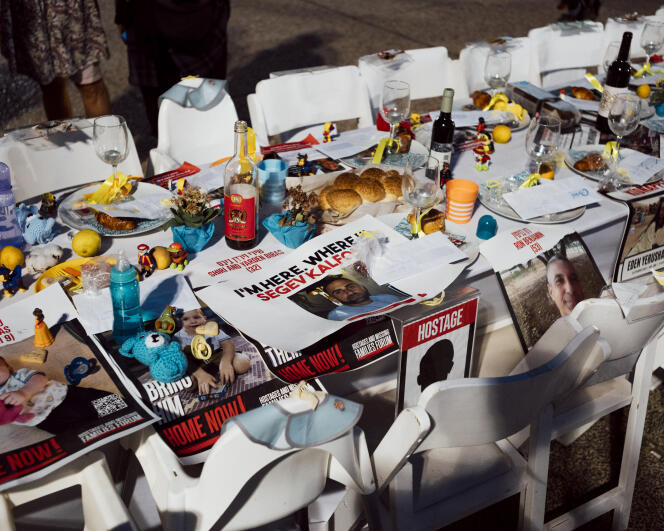The table is still set, on the square in front of the Tel Aviv Museum of Art, but the chairs provided for the guests remain desperately empty. The long table was set up on October 20, in the heart of the city, a few steps from the army headquarters, as a way of materializing the wait for the 240 hostages held in Gaza by Hamas. Intended to remind, day after day, the heavy absence of the men, women and children kidnapped on October 7, this ghost banquet has become the center of intense activity. Evening after evening, hundreds of anonymous people pass here to be together, to show their solidarity. Photos, flowers, artistic installations, candles, sales of t-shirts for the benefit of families, the square is today teeming with people who discuss, sing and, increasingly, express their anger.
For around ten days, families have taken turns sleeping in tents set up on the square. While behind the scenes negotiations to obtain new releases are intensifying between Israel, the United States and Qatar, the main intermediary with Hamas, the objective of the hostages’ relatives is to increase the pressure on their government. Tel Aviv City Hall has provided them with a large room in the adjacent municipal library, Beit Ariela, where they can shower and eat. Alongside them, a battalion of volunteers is stepping up to provide them with the necessary help, under the leadership of the Bring Them Home Now association. Including by picking them up and accompanying them to where they live, throughout the territory of Israel, as Noa Itzhak, responsible for taking care of families, explains. The city’s Labor mayor, Ron Huldai, stops by several times a week to voice his support.
But as time passes, the atmosphere changes. The initial grief is followed by a form of rage. Already, on November 6, hundreds of family members shouted their exasperation in Jerusalem, in front of the Knesset, the Parliament of Israel. A week later, Monday November 13, relatives of victims expressed their despair on the microphone, at full volume. “Sitting and singing quietly is no longer enough: you have to make noise”, underlines Shai Wenkert, father of Omer, a 22-year-old boy kidnapped while attending the music festival where some 250 young people died on October 7, in the Negev desert. He shows a photo of his son in his underwear, lying on his stomach with his hands tied behind his back, near what looks like a Gaza tunnel. Negotiations in progress? “Let them do what they want: I just want my son back. »
You have 50% of this article left to read. The rest is reserved for subscribers.
